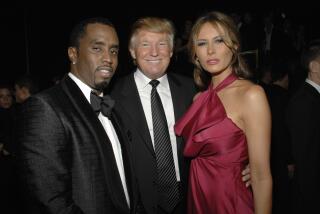The Nation : An Unholy Democracy: Cash, Religion and Politics : Elections: Consultants know that paying black ministers directly, or making contributions to their churches, can buy political influence.
- Share via
WASHINGTON — Edward J. Rollins’ boast that he helped elect Republican Christine Todd Whitman governor of New Jersey by paying black ministers to suppress the vote has stirred up bitter memories in cities where big bucks and black ministers have been used to influence voters.
We may never know what really happened in New Jersey. No minister is likely to come forward and admit to being bribed, and Rollins may now be telling the truth when he says he lied. Regardless, the reason Rollins bragged about making payments to ministers is because he and other campaign consultants know it can be a rather effective.
Tobacco, beer and liquor companies, which market heavily in black communities, have long recognized the political and economic usefulness of making contributions to the United Negro College Fund, civil-rights groups or other black organizations. Similarly, all sorts of consultants and interest groups know that paying black ministers directly, or making contributions to their churches, can be a quick way to exploit their political and spiritual influence without building real community ties. Sometimes, it is the reverse: a way to make what are only financial ties appear to be real coalitions. Had Rollins truly cared about African-Americans, he would have helped New Jersey’s black Republicans mobilize votes for Whitman.
Outside money and local black ministers also played a role in the recent campaign to deny gays protection under Cincinnati’s human-rights act. Mandy Carter, a black gay activist with the Human Rights Campaign Fund, bitterly charged that, “The far right never conducted a real grass-roots campaign or debate in black neighborhoods. They used broadcast media and outspent us 5 to 1. Seventy-five thousand dollars came directly from the Colorado group against gay rights, who have no connection to black folks in Cincinnati. There were local black ministers supporting civil rights for gays, but the right kept promoting (one) as “the” voice of the black church, and drowned the others out.”
Carter is obviously partisan, but Cincinnati Councilman Tyrone Yates contended that, “The black ministers did not form their opinions in response to outside money. Those who opposed (the measure) were against the gay-rights ordinance from the start.” But, he noted, “the campaign did play to the black community’s neurotic fears of homosexuals, and the outside money did enable some ministers’ opinions to dominate the discussion.”
There are many ministers and others in the black community who hate homosexuals or vote Republican without any outside pressure, financial or otherwise. But local black activists and politicians usually must operate within some bounds of political decency, if only for reasons of self-preservation.
Robin Cannon, president of Concerned Citizens of South-Central, recalled that Mayor Tom Bradley actively sought the help of local black ministers when he was trying to build support for construction of the huge LANCER waste-to-energy incinerator, which was opposed by many residents living near the proposed site. “At first,” Cannon said, “some of the black ministers supported LANCER as a way of supporting a black mayor. However, when community opposition grew, most of the ministers either changed their minds or remained neutral.”
Unlike Bradley, who had a long-term political agenda, outside groups promoting a single issue are often willing to draw black ministers into bitter, divisive campaigns that, like the one in Cincinnati, exploit black fears and biases in order to win at any cost.
A widely documented example was the 1987 bottle-bill campaign in Washington, D.C. Two black members of the City Council, Hilda Mason and Whilamenia Rolark, introduced bottle-deposit legislation, which opponents prevented from ever coming to a vote. In frustration, several environmentalists, who happened to be white, introduced a similar measure as a ballot initiative. The beverage industry, which retained a white political-consulting firm, made local black ministers a central focus of its $3-million campaign against deposits. Before the vote, the Glass Packaging Institute used a black lobbyist to set up glass-recycling programs at about a dozen black churches, then the beverage industry argued the deposit law would destroy the programs.
In addition, campaign-finance reports revealed that the Clean Capitol City Committee, funded by Coca Cola, beer companies, can manufacturers, liquor-store owners and local retailers, directly donated to black churches. As the campaign intensified, the industry successfully used black ministers to argue that a simple bottle bill, similar to those in New York or Massachusetts, was essentially a white attempt to victimize poor blacks.
The campaign was so polarizing that even many who opposed the deposit bill were dismayed by the opposition tactics. Lenneal Henderson, who was at Howard University in 1987, recalled: “I thought there were good environmental arguments against the bill, but it would be untruthful to say that the industry didn’t make it into a racial issue.”
Rev. Ernest Gibson, the former head of the Washington Council of Churches, also worked to defeat the bottle bill. Now he believes he should have been more cautious: “When I and some of the other ministers first got involved with the recycling programs, we never saw ourselves as part of a grand anti-bottle bill coalition that included the people who sell beer and liquor. We were probably too naive about what the industry wanted from us in return for our participation.”
Because they are trusted by their followers, and have an independent power base, black ministers have long been political power brokers in black communities. But the combination of religion, politics and money is particularly volatile. Black ministers should handle it with caution--they can easily get burned.
More to Read
Get the L.A. Times Politics newsletter
Deeply reported insights into legislation, politics and policy from Sacramento, Washington and beyond. In your inbox twice per week.
You may occasionally receive promotional content from the Los Angeles Times.










